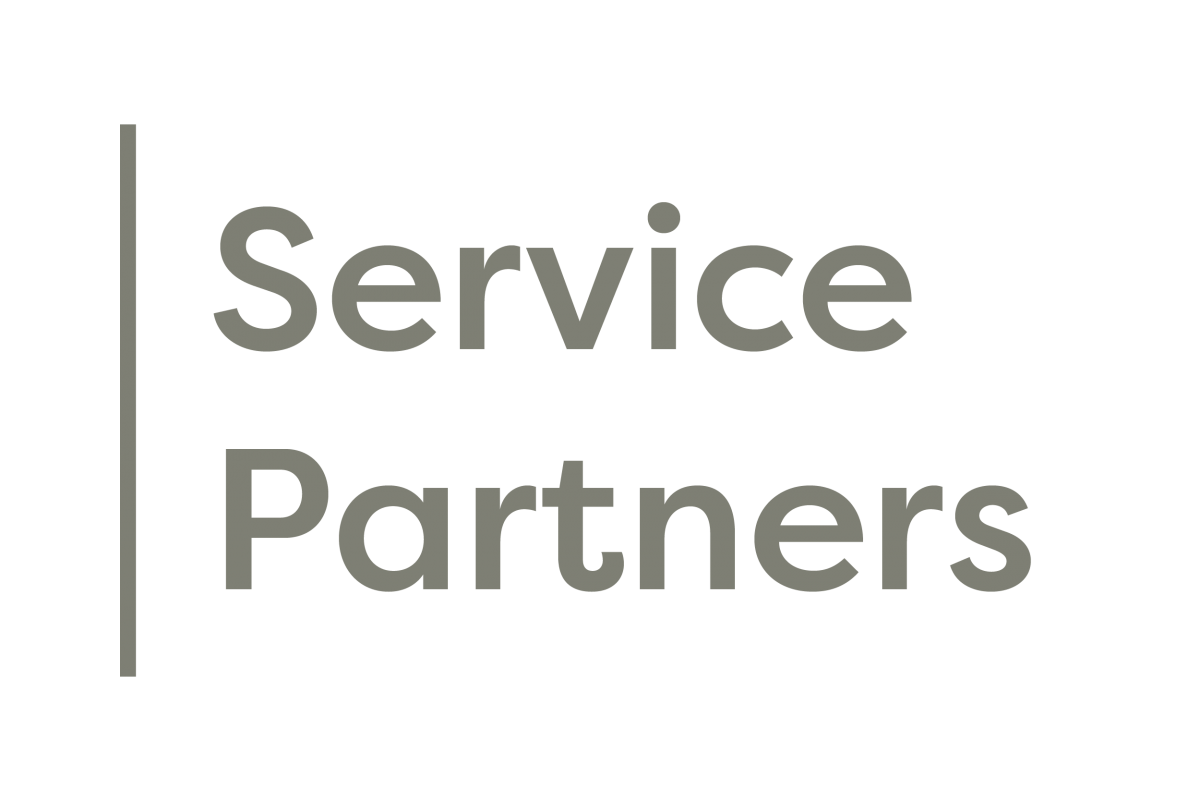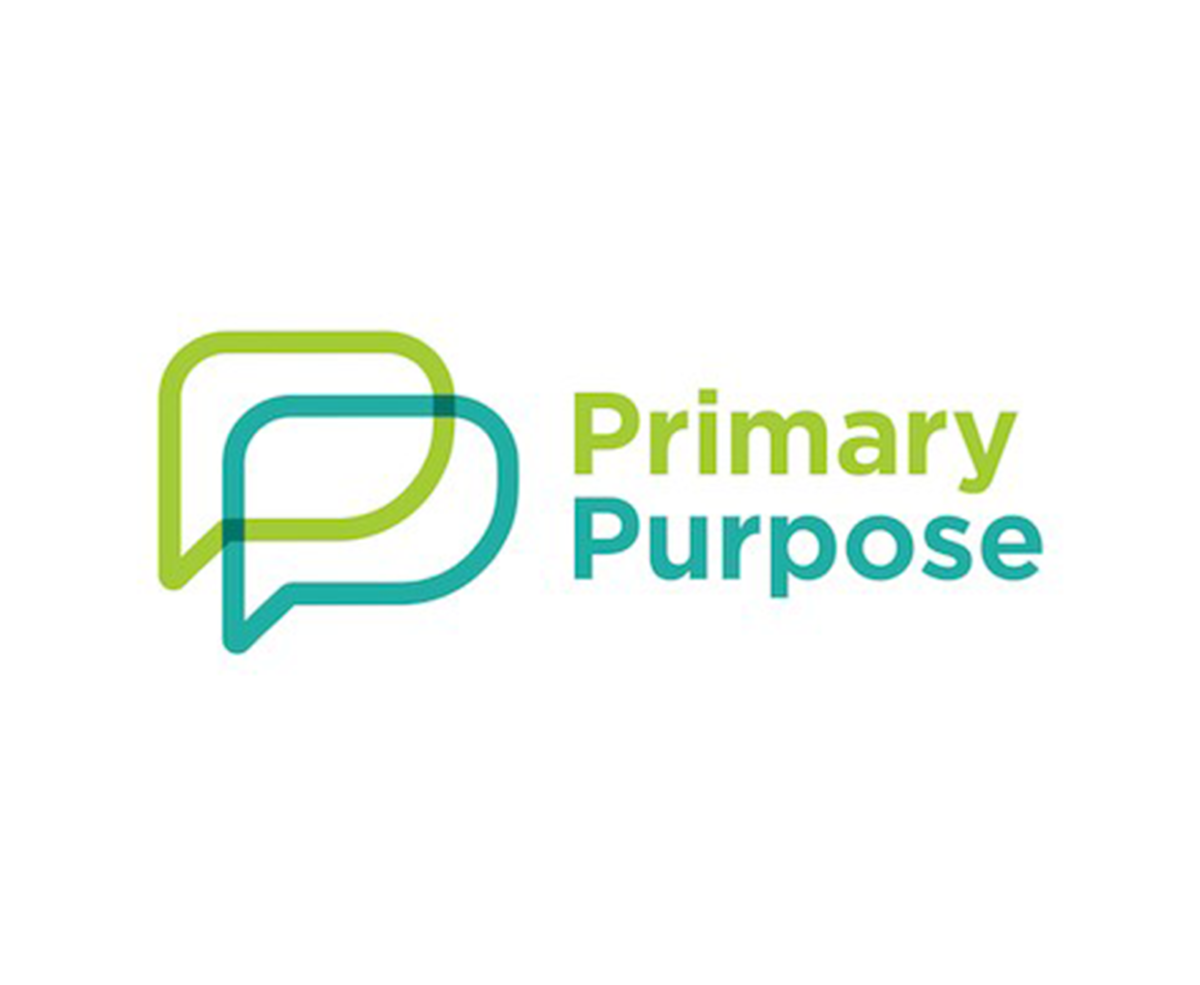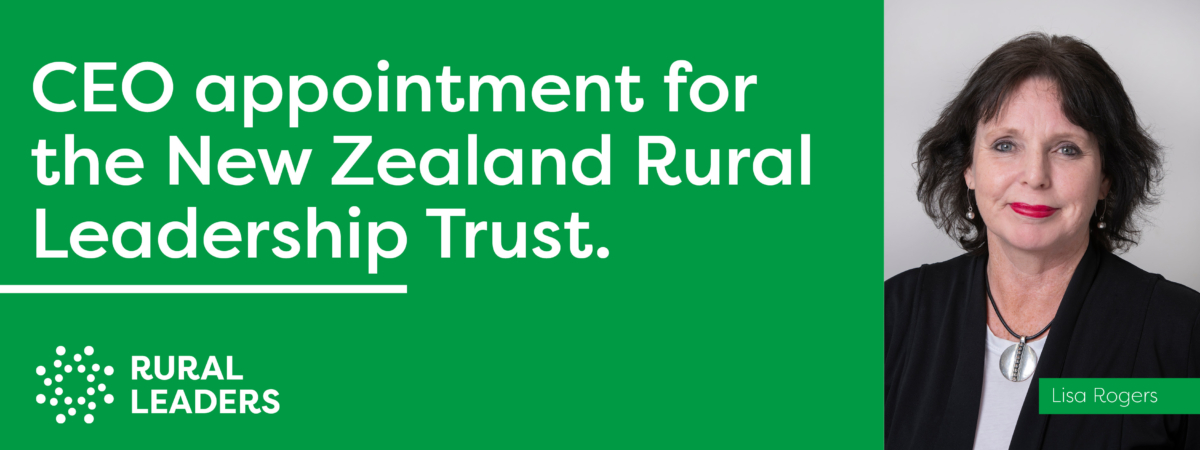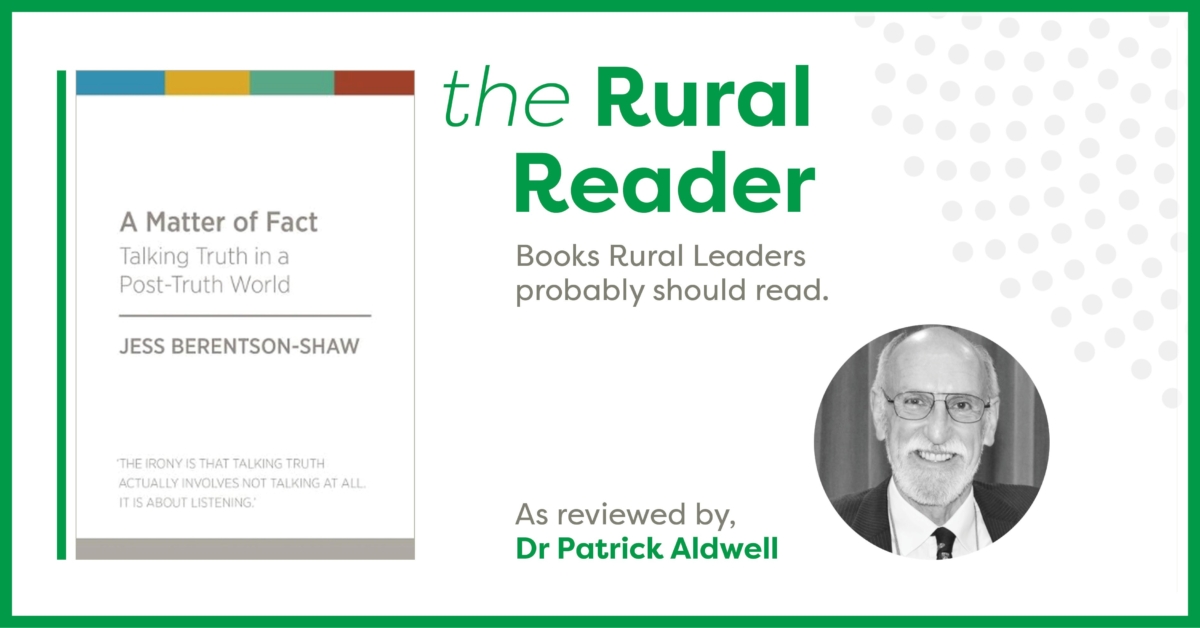Your latest issue.
Welcome to this latest Issue of the Rural Leader.
The big news for Rural Leaders over the last couple of weeks has been (and still is) the appointment of Lisa Rogers to Chief Executive Officer. We share a short article on Lisa’s appointment along with comments from Kate Scott, NZRLT chair.
In this month’s Ideas that Grow Podcast, Dan Eb, 2021 Nuffield Scholar, talks to Bryan Gibson, Farmers Weekly managing editor about his vision for a more citizen-connected food and farming system.
The podcast looks at the role of farming in an increasingly urbanised society and what it might offer beyond simply producing food.
A new report by Rural Leaders, commissioned by Food and Fibre Centre of Vocational Excellence, A Principles-Centred Leadership Model, builds on the findings of the first report released earlier this year.
A Principles-Centred Leadership Model for Aotearoa New Zealand’s Food and Fibre Sector offers three impactful elements for leaders. Each element is reviewed separately, though the real power of the model comes from the gestalt of all three elements applied together.
Last week Rural Leaders ran a pilot programme Engage, developed and delivered collaboratively with Lincoln University and with funding from the Ministry for the Environment.
Engage answers a need for a knowledge bridge for those newly entering the Sector, particularly in farmer-focused roles such as policy, advisory, or regulatory.
Our latest Kellogg graduates’ reports are out and cover such broad themes as: People in Food and Fibre, Future food and production systems, and farming and the environment. Take a look here to see the reports relevant to your industry and interests.
Just two days left to apply for a 2024 Nuffield Scholarship. We look forward to seeing applications from people in industries across the Food and Fibre sector. Applications close midnight, Sunday.
The Value Chain Innovation Programme begins on 12 November. If you’ve heard even a whisper of feedback on 2022’s programme, you’ll know that the recipe of bringing together 20+ people for one-week’s total immersion in the North Island’s leading value chains, is a good one. Apply by 17 September.
In Alumni in the Spotlight, we share news about James Allen, 2023 Nuffield Scholar, as well as recent articles from David Eade, Dan Eb, Phil Weir, and Ben Anderson.
Dr Patrick Aldwell delivers another pithy review on a book rural leaders should probably read.
We cover some news from our Partners, and a leadership opportunity with the Waikato Farmers Trust.
We hope you enjoy this issue.
The Team at Rural Leaders.
Ideas that grow podcast.
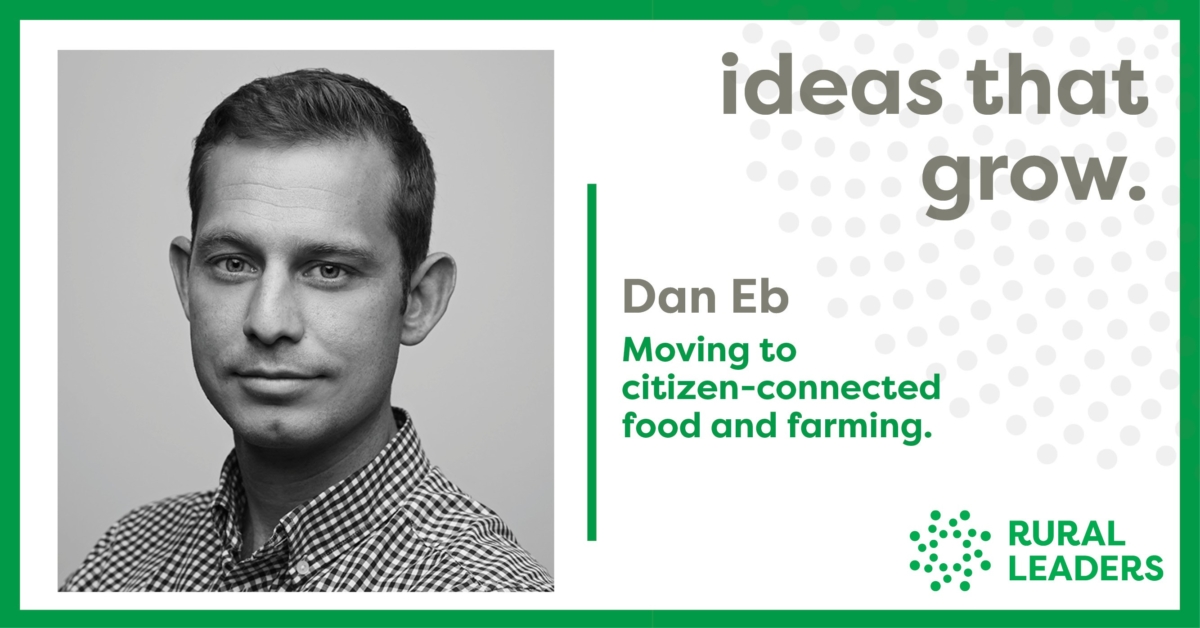
Daniel Eb: Moving to citizen-connected food and farming.
In this podcast, Dan Eb, 2021 Nuffield Scholar talks to Farmers Weekly Managing Editor, Bryan Gibson about the role of farming in an increasingly urbanised society.
How might a future look if we move to a food and farming system in New Zealand that works beyond only producing food, a system that not only benefits producers but every kiwi.
Dan proposes that if we could build local food models that by design, connect urban kiwis with the sources of at least some of their food production, then many of the challenges created by urbanism might be mitigated.
Listen to the podcast below or click here to listen to the podcast or read the transcript.
A new CEO for Rural Leaders.
The recent appointment of Lisa Rogers to the role of Chief Executive Officer ensures continuity of projects and continuation of the Rural Leaders’ momentum, for investing partners and the Rural Leaders team.
Lisa brings nearly six years’ expertise and knowledge gained as Programmes Manager and more recently, as General Manager of the Trust.
“Lisa not only brings her valuable experience to the role, she is, at her core, genuinely passionate about the people in food and fibre and the growth of its leaders.” Kate Scott, NZRLT Chair.
Take a read of the short article here.
A principles-centred leadership model – a report for Food and Fibre leaders.
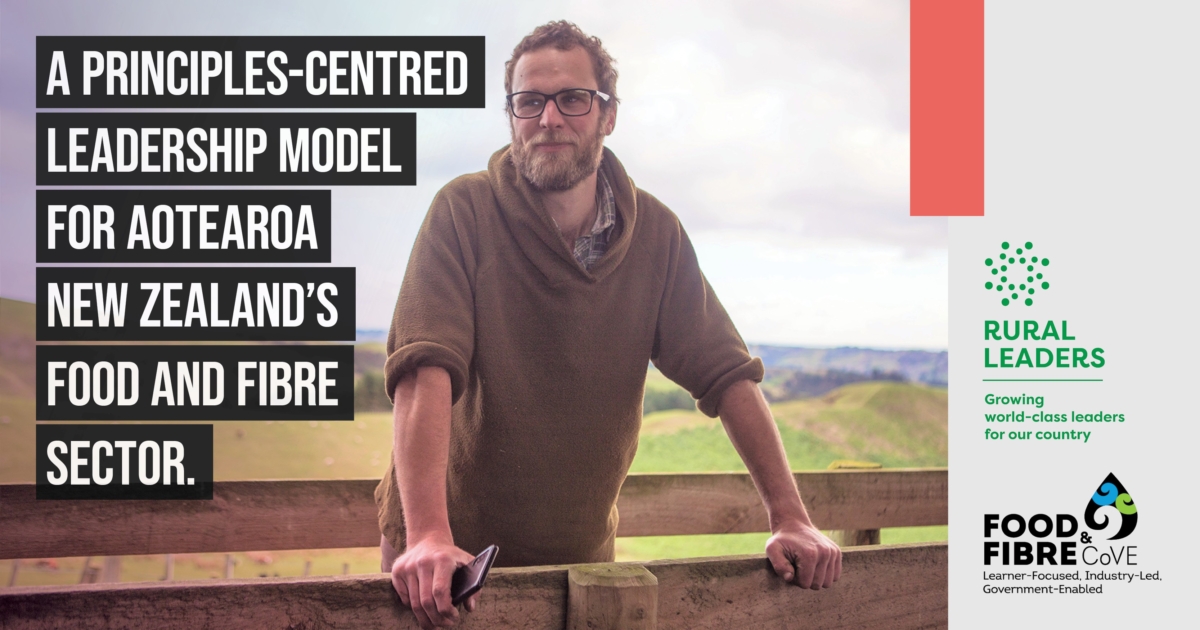
This new report by Rural Leaders, commissioned by Food and Fibre Centre of Vocational Excellence,
A Principles-Centred Leadership Model for Aotearoa New Zealand’s Food and Fibre Sector, builds on the findings of our first report.
The Principles-Centred Leadership Model proposes three impactful ideas or elements. Each element can be considered separately, though the real power of the model comes from all three elements being applied together.
The Model proposes that Leaders who truly lead unleash their potential, and that of those around them, create exponential impact for the Food and Fibre sector and for Aotearoa.
Engage – new programme pilot.
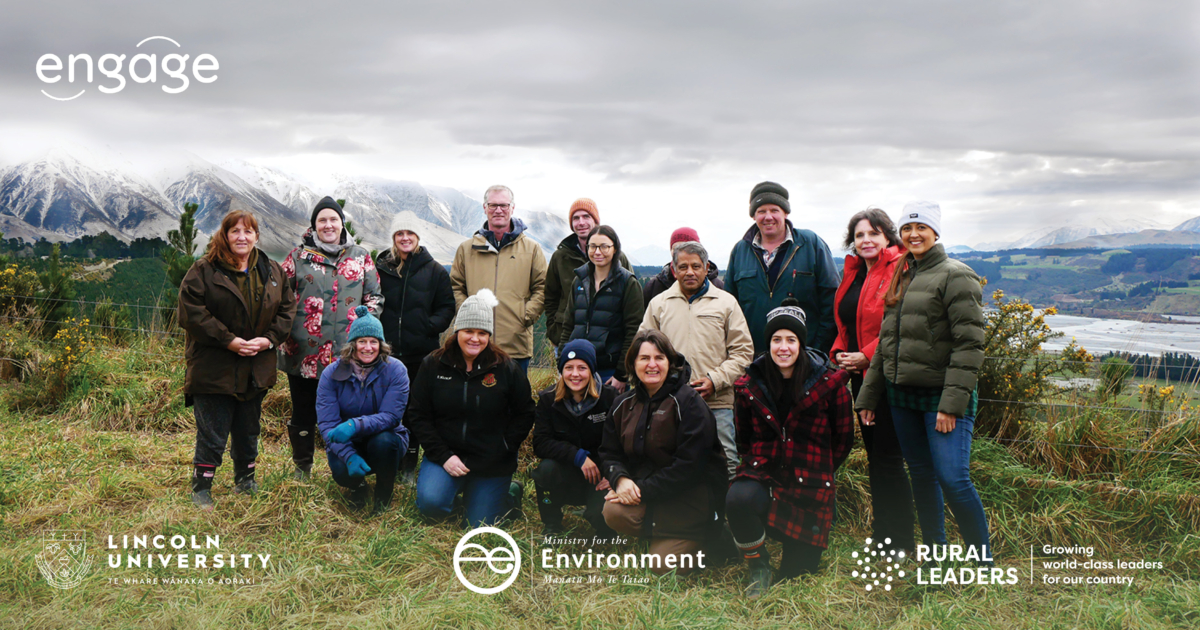
A pilot for a new programme ‘Engage’ wrapped up last Friday after three interactive and immersive days. The programme included speakers, workshops, and visits to two impressive farming operations: arable-mixed (Hamish Marr), and dairy (Matt Iremonger).
Engage has been designed, developed and delivered collaboratively by the NZ Rural Leadership Trust in conjunction with Lincoln University and with funding from the Ministry for the Environment.
Facilitated by Dr Scott Champion, the Programme is well placed to cover any knowledge gaps those entering or connecting to the Food and Fibre sector, may have. It will be ideal for people in farmer-focused policy or regulatory roles.
Take a quick read of a short article on the pilot here.
Nuffield 2024 Scholarship applications close on Sunday.
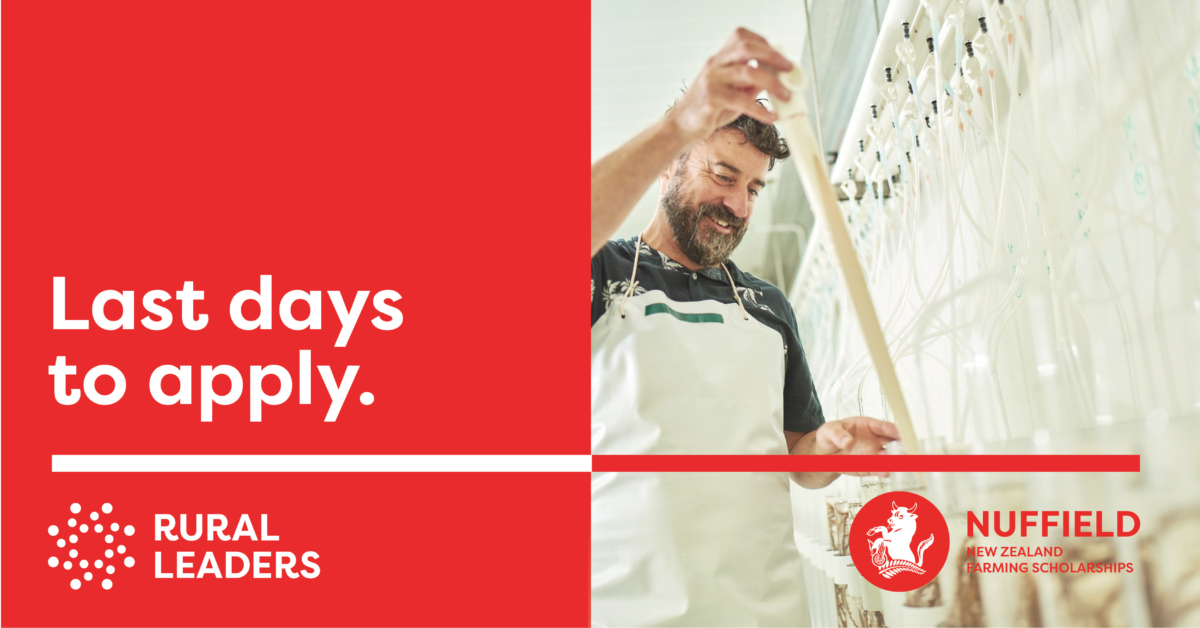
If you’re considering a 2024 Nuffield New Zealand Farming Scholarship, there’s a rapidly closing window of time to submit an application – by midnight Sunday.
Once your application is in, the Nuffield selection process will focus on finding those talented, positive people, working hard on-farm and in agri-business, for the 2024 Scholarships.
For those of us who like to cut things fine, register your interest here to receive an application form.
Reports from graduates on 2023 Kellogg Rural Leadership Programme One (K49).
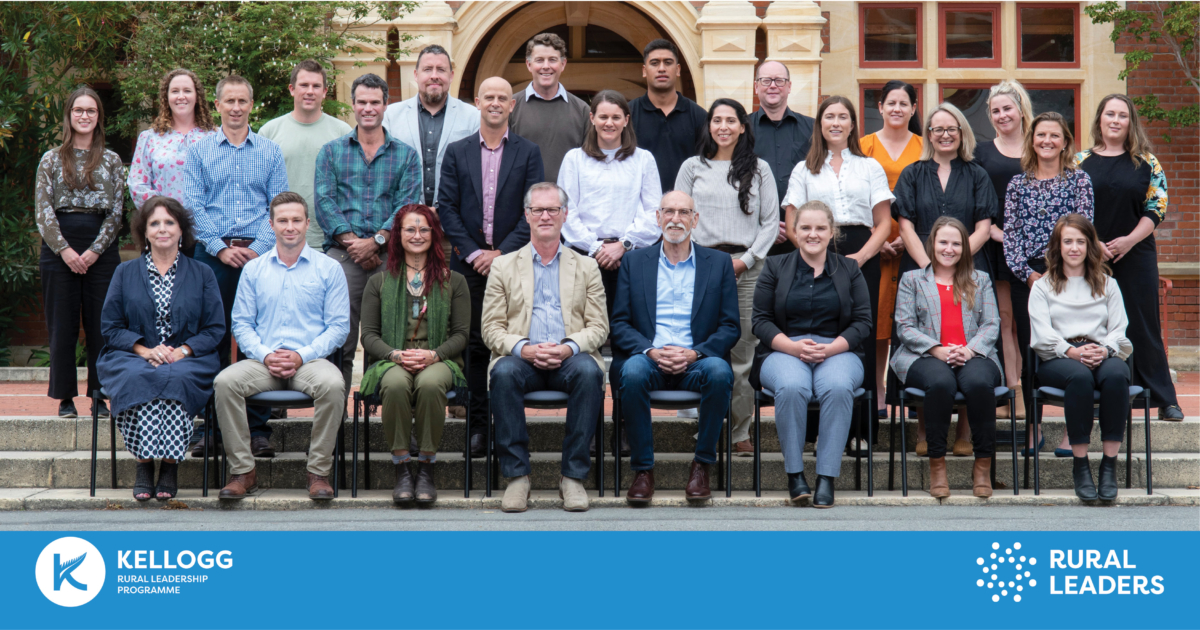
We are always inspired by the insights shown by our Kellogg Scholars. They are deeply grounded in Food and Fibre sector and come from multiple industries and parts of our value chains.
In addition to the personal growth each scholar achieves, a big part of our impact model at Rural Leaders is based on Scholar’s individual research reports.
Kellogg Scholars bring their talent and passion: but they leave the programme having delved deeply into a topic of their choosing and are equipped to think and act strategically.
The Research Reports for the 49th Kellogg Cohort can be found here.
The research covers topics such as:
- Central North Island sheep and beef and climate change
- Uptake of practises in dairy which lower emissions
- Mortality in lambing systems
- Injury risk in the Food and Fibre sector
- Consequences of the competition for farmer sentiment
- Regenerative agriculture in NZ farming systems
- The use of technology for sustainable agriculture
- Effectiveness of psychosocial services after adverse events
- Lean production tool use in arable crop production
- Championing women in beekeeping
- Leadership for change on New Zealand agriculture
- Aquaculture shellfish processes and third party certification
- ESG reporting
- Professional assistance for early stage agritech founders
Looking to the future, our sector needs an abundance of grounded-strategic leaders if we are to successfully navigate our fast-changing environment.
Note: Several Scholars from this cohort were affected by the Cyclone have deferred completion of their Phase Three until November.
If you, or others in your network are ready to develop the skills and tools to lead change, you could suggest they apply for 2024’s Programme One by 22 October.
Kellogg Rural Leadership Programme 2024 dates.
Programme One, Lincoln: 23 January – 4 July 2024
Phase One (Lincoln):
Tuesday 23 January – Wednesday 31 January 2024.
Phase Two (Wellington):
Monday 8 April – Friday 12 April 2024.
Phase Three (Lincoln):
Monday 1 July – Thursday 4 July 2024.
Applications close Sunday 22 October, 2023.
Apply for 2024’s Programme One now.
Programme Two, Lincoln: 11 June – 28 November 2024
Phase One (Lincoln):
Tuesday 11 June – Wednesday 19 June 2024.
Phase Two (Wellington):
Monday 9 September – Thursday 12 September 2024.
Phase Three (Lincoln):
Monday 25 November – Thursday 28 November 2024.
Applications close Sunday 14 April, 2024.
Apply for 2024’s Programme Two now.
You can also take a look at our Kellogg Brochure here.
Join the Value Chain Innovation Programme 12 – 18 November.
A Programme ideal for operational leaders looking to open-up their strategic thinking ability, build disruptive new insights on food and fibre innovation and gain a wider understanding of dairy, red meat, horticulture, technology, and kiwifruit value chains.
The Programme will focus on North Island dairy, red meat, horticulture, technology, and kiwifruit value chains.
Last year’s successful itinerary will be repeated again this year, with some changes and enhancements.
Read an article about last year’s programme here.
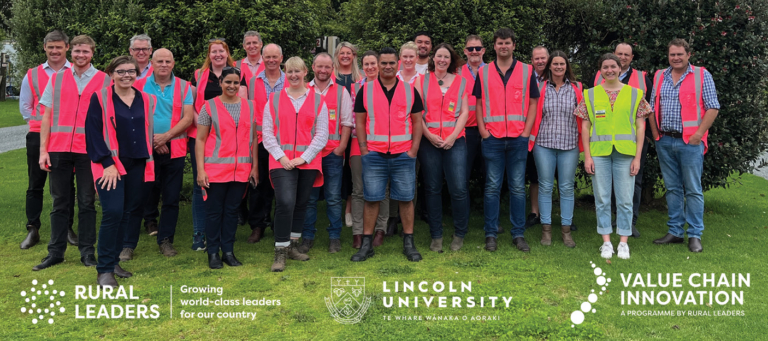
Applications are open until 17 September, 2023.
The Programme begins in Auckland, Sunday 12 November and ends with a dinner in Napier on Saturday evening, 18 November.
The length of the Value Chain is six-days. This should appeal to those who, while busy, do not want to put their professional and personal development on hold.
“If you’re in food and fibre, now is the time to be gaining a pan-sector view of as many successful business models as possible.”
Co-Facilitator, Professor Hamish Gow.
To find out more or to register your interest visit here.
Alumni in the spotlight.
Alumni in the Spotlight: Phil Weir,
Ben Anderson, Dan Eb, David Eade,
and James Allen.
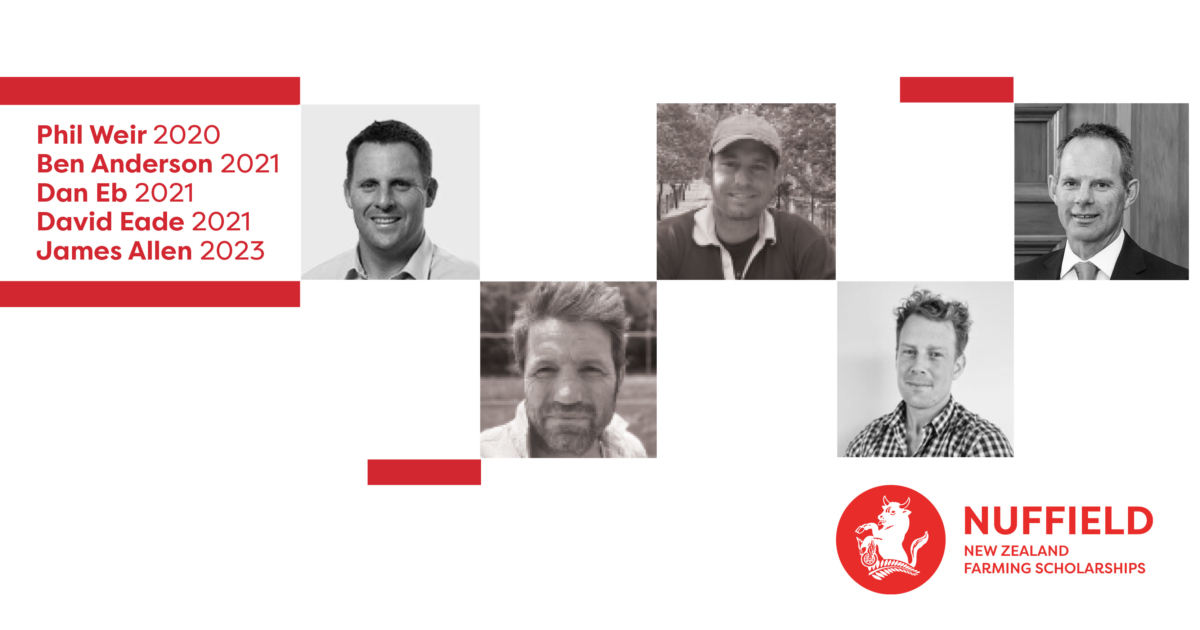
James Allen
The Global Focus Programmes (GFP) have been underway a while now, with still more to go. Nuffielders are either playing catch up (thanks COVID) or running to schedule.
In this Alumni in the Spotlight we share a couple of 2023 Scholar, James Allen’s LinkedIn posts (#NuffieldNZ) to give some indication of what goes on during Nuffield travel.
You can read more here about James’ travel so far along with a summary of travel undertaken – or about to be undertaken by Scholars.
Ben Anderson, Daniel Eb, David Eade, Phil Weir.
Four Nuffield Scholars from the 2020 and 2021 cohorts, all farmers, and agri-professionals, have brought their fresh, progressive perspectives to a series of sector change articles via Farmers Weekly.
Change will deliver us from the wolf.
Ben Anderson (2021 Scholar) – Famers Weekly, July 19
Ben was first up with an article that begins with the line, “It’s hard to see change as a positive when you feel under threat.”
Ben’s article draws on an experience he had as a member of NZ’s armed forces in Afghanistan to discuss the nature of change our farmers and growers are facing.
Ben acknowledges change is needed and inevitable, despite being extremely difficult, “It’s hard to be an agent of change when your audience has more pressing concerns, like rebuilding from cyclones, and keeping one’s stock and family fed.”
Tradition meets transformation as a family change its farm.
Daniel Eb (2021 Scholar) – Farmers Weekly, July 21
Dan produced an excellent article that takes an honest look at his family’s own farming operation, “…we’re running a business model that is slowly eroding the natural productivity of our land.”
Dan covers the dynamic of intergenerational approaches, ideas and how the need for change requires all parties to bring their experience, skills and open-mindedness to the immense task of transformative change.
This one farm, micro-analysis provides an eloquent framework for comparison to sector change, “I can’t help but see a wider food and fibre sector grappling with the same contest between tradition and transformation.”
Working out how we meet the moment.
David Eade (2021 Scholar) – Farmers Weekly, July 28
More recently, in David Eade’s article asserts that there is a need for a more open and supportive approach from industry bodies. One that might drive down emissions but not at the cost of economic activity.
“I would like an industry body that works back from our customers to optimise land use rather than the current setup that siloes and ties our identity to land use.”
A broadly similar theme can be found in the most recent article from Phil Weir.
Keep your collaboration. I want a restructure.
Phil Weir (2020 Scholar) – Farmers Weekly, August 4
Phil’s Nuffield research report ‘Restructuring Industry Good for the future’, informs this article.
In his report Phil looked at, among other things, Information silos and fragmentation across pastoral public good and the extent to which this impacts farmers and growers ability to diversify and change.
“I had the belief that the 30-year-old leadership structures across the pastoral public-good sector…needed to be subject to the same degree of change being asked of farmers behind the farm gate.”
The Rural Reader - Book reviews by Dr Patrick Aldwell.
Dr Patrick Aldwell, Academic Director, Kellogg Rural Leadership Programme, reads a lot of books. He’s also a believer in the power of lifelong learning.
In this ‘Rural Reader’, Patrick reviews A Matter of Fact: Talking Truth in a Post-Truth World – By Jess Berensten Shaw. It’s a book that investigates how organisations and individuals generate information to influence public opinion.
News from our Partners.
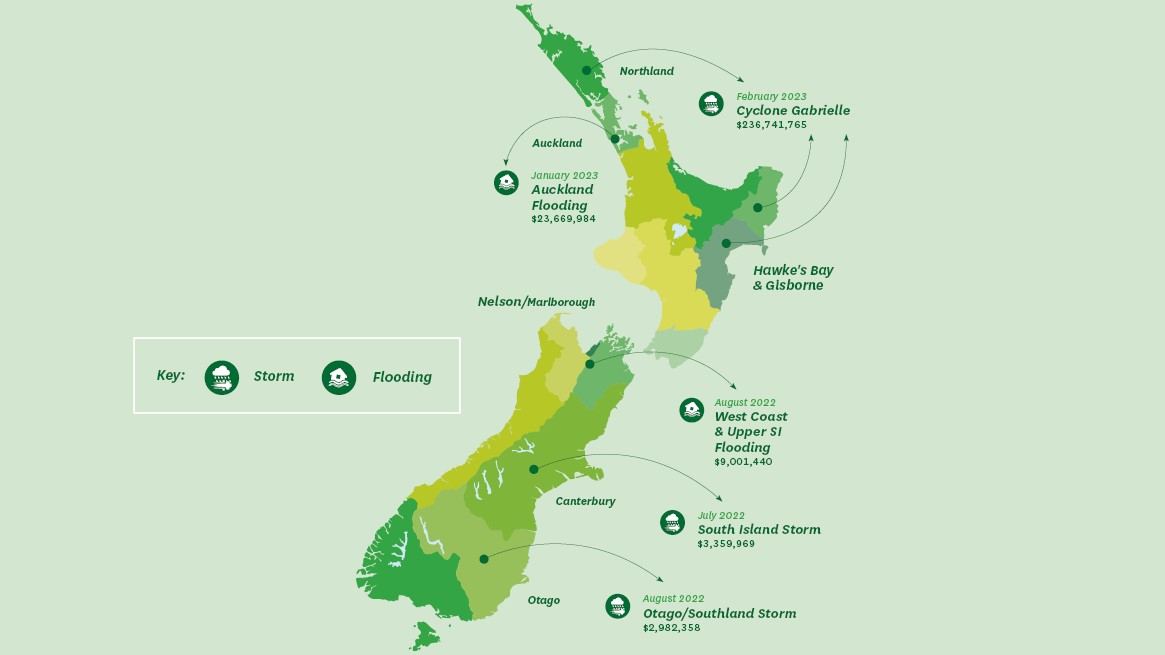
FMG - Getting through it together.
FMG have produced a map, that from a financial perspective, goes some way to showing the extent of the big weather events over the last year.
In a recent short article, FMG wrote,
‘…As you can see from this diagram it’s been quite a financial year as far as weather events go, and managing claims when things go wrong is why we’re here.
Responding to Cyclone Gabrielle will take time and we’re meeting this challenge head on. This has included evolving a number of ways we work such as establishing a dedicated Cyclone claims team.
We appreciate there’s more to be done, and we’re making progress with more than 50% of claims resolved…’
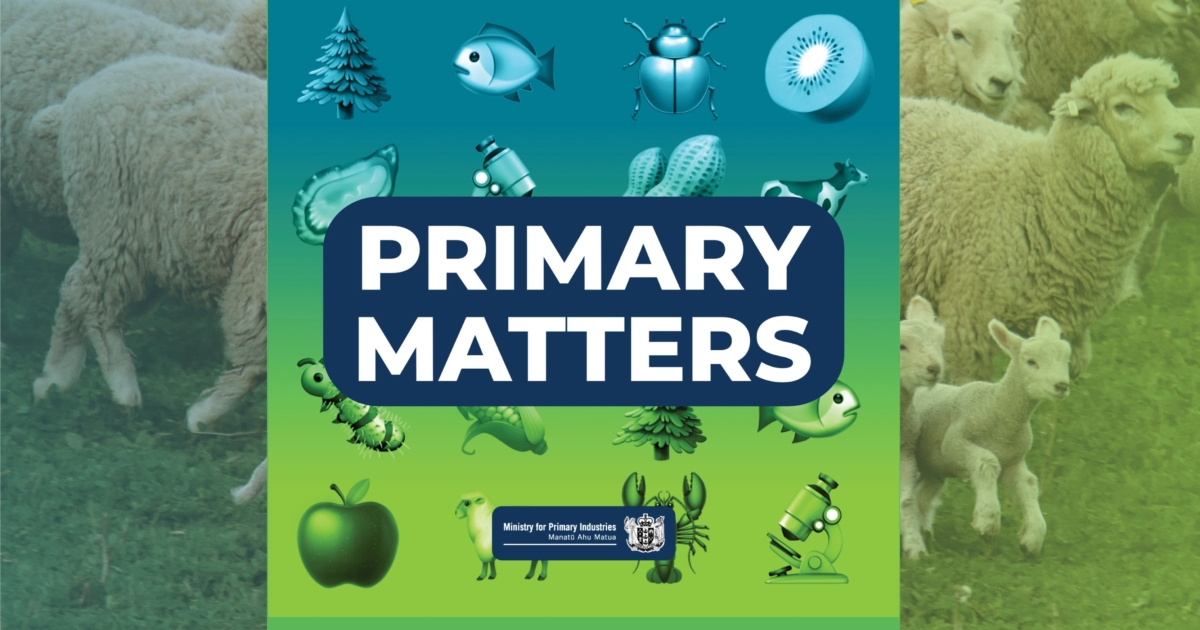
MPI - Strong-wool podcast.
MPI has just released a podcast about efforts underway to help turn around fortunes for strong-wool.
Cosmetics made of the finest wool powder, soft popcorn-like wool buds for stuffing, and acoustic wool panels for schools are all innovations their creators hope will reinvigorate New Zealand’s struggling strong-wool sector.
The goal is to double, if not treble, wool returns to farmers.
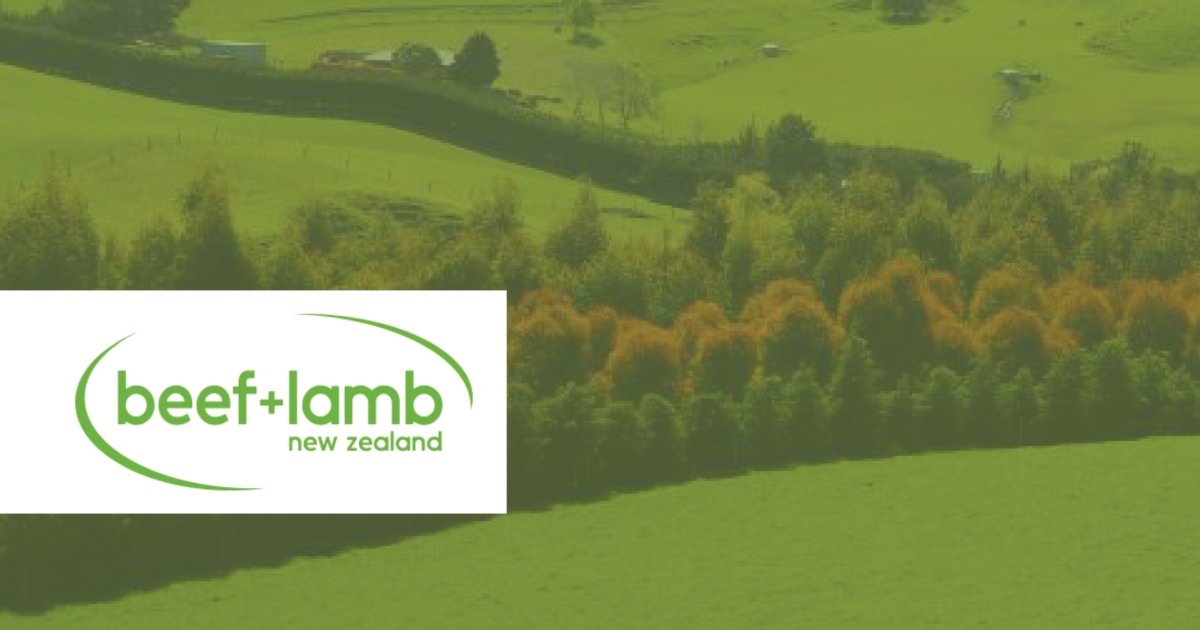
Beef+LambNZ - conversion of sheep and beef farms.
An article by Beef+LambNZ says the rate of conversion of sheep and beef land to forestry may be higher than previously thought.
‘An updated Orme & Associates report on land-use change from pastoral farming to large-scale forestry shows the amount of land sold in 2021 soared 66 percent compared to the previous year.’
You can read the full article here.
Leadership Opportunities
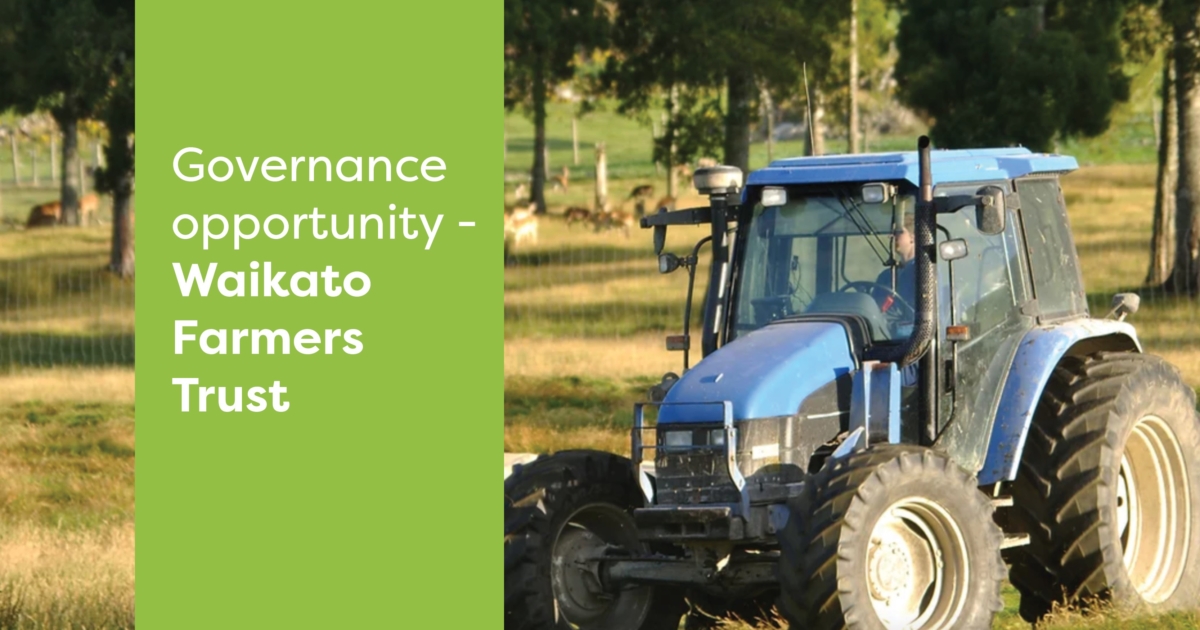
Governance - Waikato Farmers Trust.
The Waikato Farmers Trust is seeking a new Trustee with strong rural connections to join their Board.
Evidence of community, or sector commitment would be an advantage, as would empathy, and the desire to support rural communities.
Information about the trust is available at www.waikatofarmerstrust.org.nz
Expressions of interest should be emailed to admin@wft.org.nz by 27 August.
Send us your feedback.
We’d like to know what you think of the Rural Leader and of you have any ideas on how we could improve it.
Our programmes work in partnership with some of New Zealand’s leading agribusiness organisations – click here for more.

















